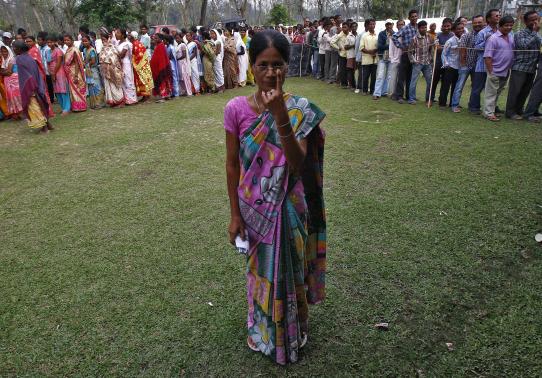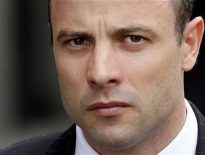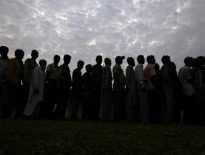(Reuters) – The first Indians cast their votes in the world’s biggest election on Monday with Hindu nationalist opposition candidate Narendra Modi seen holding a strong lead on promises of economic revival and jobs but likely to fall short of a majority.

Some 815 million people are registered to vote over the next five weeks as the election spreads out in stages from two small states near Myanmar to include northern Himalayan plateaus, western deserts and the tropical south, before ending in the densely-populated northern plains. Results are due on May 16.
Elderly women in saris and young men in jeans and polo shirts lined up outside a dilapidated sports centre before voting started on a cool morning in Debrugarh, a river town in the tea growing Assam, one of two states to vote on Monday.
We need a change, someone who will come and change the whole scenario, said handbag shop manager Ashim Sarkar, 35, lining up soon after voting started at 0700 (2:30 a.m. BST).
During high-octane campaigning at well attended rallies the length and breadth of India, Modi has been promising just that change – to jumpstart a flagging economy and sweep out the Nehru-Gandhi dynasty that has ruled India for most of the period since independence in 1947.
Modi’s Bharatiya Janata Party (BJP) and allies are forecast to win the biggest chunk of the 543 parliamentary seats up for grabs, but fall shy of a majority, according to a survey released this week by respected Indian pollsters CSDS. In such a situation, a coalition government led by the BJP is seen as the most likely outcome.
An efficient administrator, Modi is loved by big business in a country tangled in red tape. But he is tainted by accusations that he failed to stop or even encouraged anti-Muslim riots in 2002 in the state of Gujarat, where he is chief minister. At least 1,000 people died in the violence, most of them Muslims.
Modi has denied the charges and a Supreme Court inquiry found no evidence to prosecute him.
DEFEAT FOR CONGRESS
Surveys show a resounding defeat awaits the ruling Congress party, led by Sonia Gandhi and her son Rahul, after the longest economic slowdown since the 1980s put the brakes on development and job creation in a country where half of the population is under 25 years of age.
India’s remote northeast, a lush but underdeveloped border region of eight states home to just 27.4 million voters, is a test case for the appeal of Modi’s promises to fill India with new highways and fast trains and to take a tough line on frontier disputes with neighbours. China claims sections of the region.
Young people can’t find good work here – the jobs available are just about picking tea leaves, said Jyotirmoy Sharma, a manager at a tea factory who lives in Lahoal village near Dibrugarh. He voted for the ruling Congress party in India’s last two national elections in 2004 and 2009 but will switch to Modi this time.
Northeastern India is one of the few remaining strongholds for Congress. The CSDS poll found that almost half of voters in Assam, who have one of the country’s lowest per capita incomes and often still rely on the centre-left Congress’ welfare schemes, are set to support the party.
Among residents working as casual tea pickers on plantations around Dibrugarh, many had not heard of Modi.
The debate in New Delhi is focused on whether Modi can win enough seats to secure a stable coalition with India’s increasingly powerful regional parties and push through promised reforms.
India’s diverse electorate and parliamentary system mean that local leaders – and local issues such as their caste or ethnic group – still hold great sway. In some constituencies this could stymie the BJP, which has run a presidential-style campaign focused wholly on Modi.
I vote for the local candidate – that is who affects my life, said Shanti Naik, a woman selling biscuits and shampoo sachets at a stall in Lahoal who said she planned to vote for Congress. Whoever is in Delhi, it doesn’t bother me.
(Additional reporting by Biswajyoti Das, Editing by Frank Jack Daniel and Michael Perry)





